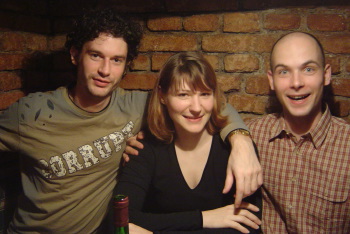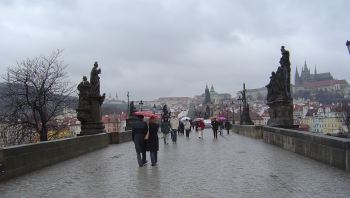We are developing the social individualist meta-context for the future. From the very serious to the extremely frivolous... lets see what is on the mind of the Samizdata people.
Samizdata, derived from Samizdat /n. - a system of clandestine publication of banned literature in the USSR [Russ.,= self-publishing house]
|
As a dedicated fan of the Australian cricket team, I have been watching them play a series of one day internationals, and Test matches, in Sri Lanka. These matches went very well for Australia and concluded last night. (I write about such things here)
Australia had played a series in Sri Lanka in 1999, and I had watched that also. In contrast to 1999, Sri Lanka looks to be a happier and more prosperous place now then it did back then. From what I could see on the television, the grounds this time were not ringed with military style police, and there was evidence of much new building, infrastructure, and normality.
For example, one of the most prominent advertisers on the grounds was a mobile phone company.
However, the peace in Sri Lanka is under pressure. Some background to the civil war can be read here, and news of latest incidents can be read here. The basic problem is that unity between the two sides in the civil war is breaking down, with dissention in the Tamil Tigers, and also within the Sri Lankan government itself. The President fired the Prime Minister and called for fresh elections. The issues can be read about here, and on first reading, I think Samizdata.net is hoping for the Prime Minister’s party to prevail.
The prime minister’s United National Party (UNP) wants to press ahead with market reforms and is pressing for free trade agreements with many countries, including the United States, Singapore, Thailand, European Union member states as well as Pakistan and Bangladesh.
President Kumaratunga’s party is for a market economy with a ‘human face’ and has ruled out privatisation of banks, transport and several other utilities. Her ally the JVP wants state control on key sectors of the economy and supports price controls on essentials, and to curb imports of what it considers non-essentials. Both want to offer a plethora of farm subsidies.
The monks’ party is for an open economy based on ‘Buddhist values’.
I am bemused by the “Buddhist values” of an open economy… and not thrilled to read about farm subsidies! Not enough Sri Lankans are reading Samizdata!
Anyway, if peace can be maintained, I might be able to visit Sri Lanka the next time the Australian cricketers go there. Many Australians went this time, and looked to be having a rousing good time. That sounds like my idea of a good time.
One of the reasons for slightly less output on this august blog is that two of the editors and the inimitable Gabriel Syme were off meeting other sinister Illuminati in Prague for a fine Czech beer or six.

No prize for guessing where the Illuminati meet in Prague Prague, like Bratislava, is known for its splendours…

Hot… steamed in fact One of the upsides of the dire weather was that many of the usually crowded tourist attractions were almost deserted.
We meet one of the leading central European bloggers, Tomas Kohl (on the right)…

Tomas sinks some fine Czech Pilsner with Adriana and Gabriel Syme → Continue reading: Samizdata.net on the river Vltava
The government talks a lot about ‘investing’ in hospitals and schools. That is why we have to pay extra taxes. We all know that New Labour’s experiment with spending has been a flop, with the improvements to services tiny compared with the increased spending.
One problem is that the cash we think is going to be spent on operations and classrooms gets diverted. Sometimes this is because of excessive bureaucratic layers, like Local Education Authorities. But sometimes it is rather more blatantly wasted.
Like with government attempts to encourage ‘e-society’.
The private sector worldwide has done a really good job at providing opportunities for e-society. Just look at AOL Instant Messenger, webcams, blogs, web site forums, Friendster and Orkut.
But the fact that e-society is so abundantly provided by the private sector has not stopped the UK government thinking it should get involved. Back in the autumn, I got an e-mail from James Crabtree of VoxPolitix asking if I would blog about a new project called MySociety.org, run by his friend Tom Steinberg, a former No. 10 adviser. I have met Crabtree a couple of times and like him, so I thought I should do my bit. I tried for an hour or so to write a blog about this new project, but I just could not. The project was utter crap. And I just could not write anything nice about it with a clear conscience.
Well, that project which I thought was ‘utter crap’ is now being funded by the government. It has just been awarded £250,000 as “part of something called the e-innovations fund, a pot of government cash set aside to stimulate useful and innovative new online projects”.
Wired has a follow-up story on the case of Nebraska farmer and his identity card (Hiibel v. Sixth Judicial District Court of the state of Nevada, 03-5554). The justices of the Supreme Court heard arguments last Monday in a first-of-its kind case that asks whether people can be punished for refusing to identify themselves.
The court took up the appeal of a Nevada cattle rancher who was arrested after he told a deputy that he had done nothing wrong and didn’t have to reveal his name or show an ID during an encounter on a rural road four years ago.
Larry “Dudley” Hiibel, 59, was prosecuted, based on his silence, and finds himself at the center of a major privacy rights battle. Hiibel, dressed in cowboy hat, boots and a bolo tie, was defiant outside the court.
I would do it all over again. That’s one of our fundamental rights as American citizens, to remain silent.
The case will clarify police powers in the post-Sept. 11 era, determining if officials can demand to see identification whenever they deem it necessary.
Nevada senior deputy attorney general Conrad Hafen told justices that “identifying yourself is a neutral act” that helps police in their investigations and doesn’t – by itself – incriminate anyone. But if that is allowed, several justices asked, what will be next? A fingerprint? Telephone number? E-mail address? What about a national identification card? Hiibel’s lawyer, Robert Dolan, told the court:
The government could require name tags, color codes.
Justice Sandra Day O’Connor pointed out the court never has given police the authority to demand someone’s identification, without probable cause they have done something wrong. But she also acknowledged police might want to run someone’s name through computers to check for a criminal history.
Marc Rotenberg, president of the Electronic Privacy Information Center, said if Hiibel loses, the government will be free to use its extensive data bases to keep tabs on people.
A name is now no longer a simple identifier; it is the key to a vast, cross-referenced system of public and private databases, which lay bare the most intimate features of an individual’s life.
Spotted in Friday’s print version of the Evening Standard:
Mr Blair’s two security advisers, Sir David Omand and Sir John Stevens, tell us each week that such bombs [in public places] are “unavoidable”, to exonerate themselves in advance from blame. They tell us to be fearful and vigilant. But they do nothing physically to protect us.
There are no walls going up to block Oxford Street from car bombs. There are no sniffer dogs at Holborn Tube or scanners at the entrance to Trafalgar Square. The citizens of London are being told, in effect, to look after themselves and don’t blame the Government. Meanwhile Sir David and Sir John spend millions protecting those for whom they work.
– Simon Jenkins
In other words: You are cannon fodder. The state is not your friend.
Have a cheerful weekend.
With thanks to Guy Herbert
U.S. government agencies such as the Department of Homeland Security (DHS) are being pitched many new technologies, but government technologists have an obligation to consider ethical and moral issues such as privacy when embracing new applications, concluded a panel of technology experts speaking at the FOSE government computing trade show.
AFFIRM (the Association for Federal Information Resources Management) plans to launch a Web site addressing technology and ethics within weeks and eventually issue a white paper on related topics.
Hastings and Alan Paller, director of research at the SANS Institute, questioned whether IT vendors can be expected to present the ethical issues when they pitch their products to government buyers. Sales people are not generally trained to address difficult ethical issues while trying to make a sale; they’re trained to tell potential customers what the customers want to hear, Paller said.
The panel also addressed several questions from the audience, largely of government employees. One question was:
What’s wrong with the statement, ‘If someone has nothing to hide, why shouldn’t we be able to take their biometric data?’
Reeder answered:
I would submit to you that none of you would tolerate routine invasion of your homes and searching of your personal possessions by a police force because you had nothing to hide.
Many people, Samizdatistas included, have wondered just where all of those billions of dollars of UN Oil for Food money went. It was rather apparent food and medicine were among the last things for which they were used.
Someone has finally decided to audit the accounts. According to Senior CPA Advisor Dan Senor:
In response to allegations of the former regime’s misconduct in the
administration of the oil-for-food program, Ambassador Bremer has issued a directive to interim Iraqi ministers, CPA senior advisors and regional governance coordinators to safeguard all information related to the oil-for-food program. This includes contracts, amendments and annexes to contracts and supporting materials. The directive stated that documents should be inventoried and recorded and inventories provided to CPA as soon as possible. Irregularities, including any evidence of bribes, kickbacks or corruption, should be noted. CPA officials will review submitted inventories and may seek access to any or all records associated with the oil-for-food program. These documents will be made available to investigations, some of which are being conducted by the United Nations, the U.S. Congress and Iraqi officials. The coalition is also assisting interim Iraqi ministers in identifying any current ministry officials who may have knowledge of misconduct arising from the administration of the oil-for-food program.
I can hardly wait to find out which bureaucracy embezzled more: the United Nations or Saddam’s Baathists.
Some time ago I posted here that the weekly British publication, The Spectator, edited by Tory MP and jolly good chap Boris Johnson, had lost some of its quality and class.
I can just about take reading Simon Jenkins on why we should stop worrying about terror, even if his comments are published on the day of the Madrid horror. I can even take reading Ross Clark on why we should learn to love speed cameras and pay inheritance tax, or learn from Sir Max Hastings as to why we British are so much finer military strategists than those awfully common Americans with their silly Apache helicopters. And of course the Spectator has the brilliant Mark Steyn, who looks increasingly uncomfortable amid the snobs, America-bashers, Murdochphobes and BBC castoffs like Rod Liddle.
But that magazine’s ‘High Life’ columnist, Taki , is neither witty, interesting or informative. His writings frequently plummet depths I thought it impossible to tolerate in that magazine. He has got into difficulties before over his outspoken attacks on the often Jewish policymakers and intellectuals he associates with the neo-conservative movement. That of course is not necessarily proof that Taki is an anti-semite, and it is a charge one should only make with great care.
But when you read about Taki’s thoughts in this week’s magazine (link requires registration) on the “wallet-lifting” Richard Perle, what on earth is one to suppose Taki is getting at? (“Those People, you know, very crafty with money”).
One might ask why one should care. Well, I care about the fate of what has been at times the finest magazine in the English language, a place that has inspired me with writers of such grace as the late Colin Welch and the brilliant satire of the late, and much missed, Auberon Waugh. We also need, in a healthy media world, a weekly alternative to the awful New Statesman. But the Greek boy has always been the bad smell at the back. Time for him to go. Go on Boris, make my day.
I am not really in the market for big, long books about the Cold War, but I do like a good short one from time to time, and Communism by Richard Pipes, is looking good so far. I started by reading the conclusion, and now I am reading the penultimate chapter, “The Third World”.
Here is what Pipes says about the relationship between poverty and Communism:
Conventional wisdom holds that poverty breeds Communism. Reality is different: poor countries do not opt for Communism. Nowhere in the world has a poor majority, or any majority for that matter, voted the Communists into power. Rather, poor countries are less able to resist Communist takeovers because they lack the institutions that in richer, more advanced societies thwart aspiring radical dictators. It is the absence of institutions making for affluence, especially the rights of property and the rule of law, that keeps countries poor and, at the same time, makes them vulnerable to dictatorships, whether of the left or right variety. In the words of a student of the Cambodian Communist regime, the most extreme on record, ‘the absence of effective intermediary structures between the people and their successive leaders predisposed the society to the unrestrained exercise of power.’ Thus, the same factors that keep countries poor – above all, lawlessness – facilitate Communist takeovers.
That rings true. In general, it has always seemed to me that the favourite metaphor of ‘rabid anti-communists’ (i.e. the people who underestimated the true depths of Communist disgustingness only somewhat), to the effect that Communism was like a disease, is dead right. And Pipes is asking: how strong was your country’s immune system?
But what is this? A former Archbishop of Canterbury daring to criticise Islam?
Muslims claim a former Archbishop of Canterbury who criticised Islamic culture is “recycling” prejudice.
Speaking in Rome, Lord Carey said Islamic regimes were authoritarian and committed to power and privilege.
Lord Carey said not enough moderate Muslim leaders had condemned suicide bombers “clearly and unconditionally”, the Daily Telegraph reported.
But Muslim Council of Britain secretary general Iqbal Sacranie said: “One is dismayed by Lord Carey’s comments.”
I just bet one is.
I cannot find the original Telegraph piece that this BBC report refers to, but I did come across this, from 2001, when Carey actually was the Archbishop. Which is interestingly different from what he is now saying.
The BBC report continues:
BBC religious affairs correspondent Robert Pigott said Lord Carey’s speech had probably been more balanced than the impression given by the newspaper.
(Not that the BBC ever gives an unbalanced impression of anything.)
“One of the things that underlines his concern is the growth of Wahhabism – a very radical part of Islam – which is becoming quite dominant in the developing world,” he told Radio 4’s Today programme.
“There was also a sense when Lord Carey was archbishop, that he was growing increasingly frustrated by the problem in Islam, as he saw it, of there being something of a lack of a hierarchy where leaders could say authoritative things which could in some sense be morally binding for Muslims in general.”
Which would be why President Bush doesn’t rely on “diplomacy” (that is to say, mere promises of future good behaviour from those in no position to keep them), but concentrates instead on hunting the terrorists down in their own back yards, and uses diplomacy merely to pressurise those who get in the way of that process.
The West is learning.
ADDENDUM: In the hilarious first draft of this, I attributed the paragraph about Bush chasing terrorists, as well as the paragraphs above that, to the BBC. The mother of all misplaced html commands, I think you will agree. I do not apologise, because this was too much of a laugh, and laughs are good.
More Tsarism, this time of the Euro variety:
European Union leaders agreed yesterday to rush forward a clutch of EU-wide surveillance measures and created an anti-terror “Tsar” in response to the Madrid bombings.
The list of counter-terrorism measures pushed by Britain, France and Spain at a Union summit in Brussels include plans to retain mobile telephone records, e-mail and internet data indicating the time and address of all websites visited.
White Rose has further EUro-reportage and links about similar EUro-stuff, here and here.
This report also illustrates the point that EUrope is not just a machine to enable foreigners to muck the British around, it is also a machine to enable to British to muck the foreigners around: a sort of universal substitute empire for all the old European imperialists. Having been made to stop tyrannising over their previous imperial possessions, the tyrannising classes have switched instead to tyrannising over each other’s nations. Bad luck on the rest of us, but there it is, these people have to have someone to tyrannise over.
Meanwhile, proof that when the Euro elite wants something, it just beavers away until it gets it:
A new summer deadline for agreement on the EU constitution has been agreed by European leaders, putting renewed pressure on Tony Blair and his non-negotiable “red lines”.
Mr Blair had seemed content for the troubled constitution to slip off the agenda after December’s summit ended in deadlock. But a new deadline for agreement on the document has been set.
Although, when the time comes that the people who want EUrope to fall to bits are finally in the ascendancy, they will have the perfect precedent for saying: “We are going to keep on destroying this thing until we succeed, and will ignore all counter-opinions, of, e.g. voters, because these opinions are anti-historical and do not matter. We are doing what we know to be best. Our opponents are deluded. That’s what the founders of this thing did when they started it, and we are merely following their inspiring example.”
Trouble is, by the time that happens, those people may be even nastier.
I will read this piece by David Carr to cheer myself up.
Paul Ehrlich had written in The Population Bomb (1968) that it was “a fantasy” that India would “ever” feed itself. By 1974 India was self-sufficient in the production of all cereals.
–Gregg Easterbrook, in a 1997 profile of Green Revolution hero Norman Borlaug in the Atlantic Monthly. (Go read the whole article. It’s good).
(Link via Instapundit).
|
Who Are We? The Samizdata people are a bunch of sinister and heavily armed globalist illuminati who seek to infect the entire world with the values of personal liberty and several property. Amongst our many crimes is a sense of humour and the intermittent use of British spelling.
We are also a varied group made up of social individualists, classical liberals, whigs, libertarians, extropians, futurists, ‘Porcupines’, Karl Popper fetishists, recovering neo-conservatives, crazed Ayn Rand worshipers, over-caffeinated Virginia Postrel devotees, witty Frédéric Bastiat wannabes, cypherpunks, minarchists, kritarchists and wild-eyed anarcho-capitalists from Britain, North America, Australia and Europe.
|







